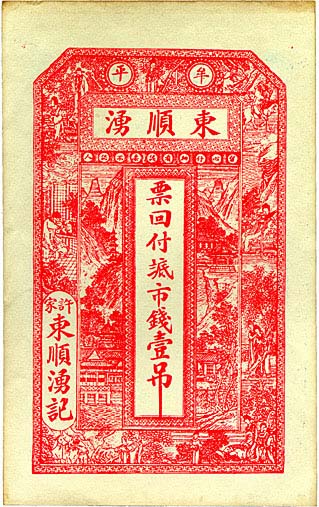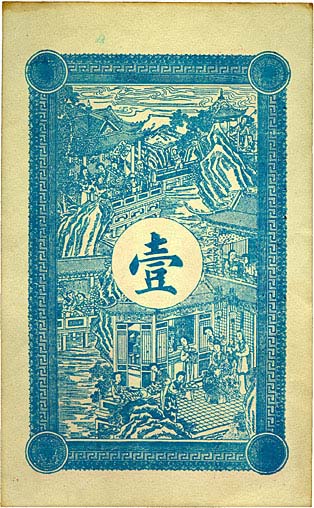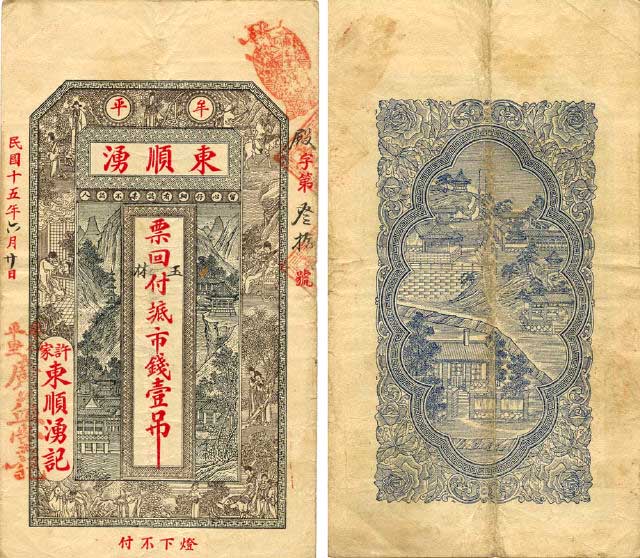A challenge to me, is it a challenge to you too ?
I have placed below a small piece of paper here. It is, judging by appearance, a piece of Ch'ien P'iao  * (paper money) or credit instrument printed by the old-method, and designed in old-style. The figures on the obverse indicating the value of this paper money is ninety eight percentage of one Tiao * (paper money) or credit instrument printed by the old-method, and designed in old-style. The figures on the obverse indicating the value of this paper money is ninety eight percentage of one Tiao  *. But its date of issuing has no reference. There can be found no serial number, no seal or signature on the both sides of this paper money. I don't know where it came from. This may be an unused private bill issued by some Ch'ien Hao *. But its date of issuing has no reference. There can be found no serial number, no seal or signature on the both sides of this paper money. I don't know where it came from. This may be an unused private bill issued by some Ch'ien Hao  or Ch'ien Chuang or Ch'ien Chuang  (financial institutions or money shops) for circulating on the local market in ancient China.
In the Chinese history, the first true paper currency was Chiao-Tzu (financial institutions or money shops) for circulating on the local market in ancient China.
In the Chinese history, the first true paper currency was Chiao-Tzu  (means exchange medium) which appeared in Szechwan in the 11th century. Of course, this small piece of paper is not Chiao-Tzu, but what is it? Is it a counterfeit paper money ? (means exchange medium) which appeared in Szechwan in the 11th century. Of course, this small piece of paper is not Chiao-Tzu, but what is it? Is it a counterfeit paper money ?
* Ch'ien P'iao
* Tiao |
Extremely Rare A ~ Very Rare B ~ Rare C ~ Not So Many D ~ Common E
|
Issue Evolution and Peculiarity Obverse  Reverse  | |||
Additional information from Mr.Ed Bohannon of USA
|
About your inquiry on the unknown paper money. I looked it up in the
definitive catalog, "Chinese Banknotes" by Ward D. Smith and Brian
Matravers, 1970 and it is not listed. I believe it to be a sample note
printed for the purpose of selling printing to banks or stores before
the 1900's. I would'nt place too high a value on it, but it is rather
unusual.
[Thanks indeed to Mr.Ed Bohannon] YKL |
Additional information from Mr.Thomas Chow
|
In reference to your "unknown paper money - Tung Shun Yung", I found an
illustration (no. 432), on the book "Catalogue on the Recent Banknotes
and Coupons", written by Mr. Zhang Zhi Zhong (Cheung Chi Chung) - ISBN
7-5015-1534-4 / Z-67
There is no description on the specified note, however there is prefix and serial number printed at the right hand side , and mentioned at the bottom "no payment when lighting on", plus the date: 20th May, 15 th year of Republic of China (1926) at the left side. Most probably your note is a blank note before circulation, and the above mentioned details will be added by the issuing company by printing with wooden block and the serial number in written. P. S. : Mau Ping is a county near Yantai, Shandong Province. [Thanks indeed to Mr.Thomas Chow] YKL |
|
I am a collector from Moscow, Russia, collecting of Chinese coins and paper money for more than 20 years and have about 100 items of Chinese local paper money.
I have found one item similar to yours "unknown paper money - Tung Shun Yung" in a new catalogue of Chinese local paper money on page 217. The obverse (value, picture etc) is the same but color is black - dark blue. The money has a serial number printed at the right hand side and mentioned at the bottom "no payment when lighting on", plus the date: 30th May,15 th year of Republic of China (1926) at the left side. There is a picture of a mountain village without people on the reverse. The color of the reverse is dark blue. Size 192 x 108 mm. Rareness: common (1 star).
Another additional information from Mr.S.SHEVTSOV of Russia I'm a collector of Chinese paper money from Moscow, I have send you a message about Dong Shun Yong local paper money some months ago. Now I have made scan images of 2 local paper money and sending to you for your reference. You can place it on your WEB site if you want. First image - Dong Shun Yong local paper money, but it differs from your image. It has date [20th June, 15th year of Republic of China or 20th June 1926] of issue, some imprints of seals which mean that it has been in circulation, it has dark blue color of obverse and reverse is different from yours.
Second image – Zhen Hua Gongsi. It differs from your image too. It has serial number and reverse is different. I think it was not in circulation because it has no any marks or imprints on it. [Thanks indeed to Mr.S.Shevtsov] YKL |
Additional information from Mr.Erwin Beyer
|
I have been a collector of Chinese paper money for more than 40 years. I read with interest the comments on the 1 Diao note "dong shun yong" (i always use the official pin-yin romanization) from Mouping, Shandong. I bought the note for my collection 15 years ago. It is pictured and described in my catalog on Chinese banknotes, vol. 13, p.168. I assigned catalog no. B-D130-10 to it. [Thanks indeed to Mr.Erwin Beyer] YKL |
 , Hui Tzu
, Hui Tzu  and Kuan Tzu
and Kuan Tzu  in Sung dynasty; but Chiao Ch'ao
in Sung dynasty; but Chiao Ch'ao  and Pao Ch'ao
and Pao Ch'ao  were frequently used during the Yuan dynasty. Ta Ming T'ung Hang Pao Ch'ao
were frequently used during the Yuan dynasty. Ta Ming T'ung Hang Pao Ch'ao  (Treasured currency of Great Ming) was used as the name of paper money in Ming dynasty. Ta Ch'ing Pao Ch'ao
(Treasured currency of Great Ming) was used as the name of paper money in Ming dynasty. Ta Ch'ing Pao Ch'ao  (Treasured currency of Great Qing) was the last name for the old-style paper money in the Qing dynasty. However, various paper currencies and styles were used throughout the dynasties.]
(Treasured currency of Great Qing) was the last name for the old-style paper money in the Qing dynasty. However, various paper currencies and styles were used throughout the dynasties.]
 [short strings of 980 cash]. The other names for a string of 1000 cash were Kuan
[short strings of 980 cash]. The other names for a string of 1000 cash were Kuan  and Ch'uan
and Ch'uan  . Ch'uan and Tiao were prevailed in the Ming and Qing dynasties as well as in the early years of the Chinese Republic. While Kuan was used in Sung and Yuan dynasties.]
. Ch'uan and Tiao were prevailed in the Ming and Qing dynasties as well as in the early years of the Chinese Republic. While Kuan was used in Sung and Yuan dynasties.]

 ,
, 1994, ISBN 7-5000-5469-6.
1994, ISBN 7-5000-5469-6.
 ,
,  (The Currency History of China), 1988. ISBN7-208-00196-0/K.47
(The Currency History of China), 1988. ISBN7-208-00196-0/K.47